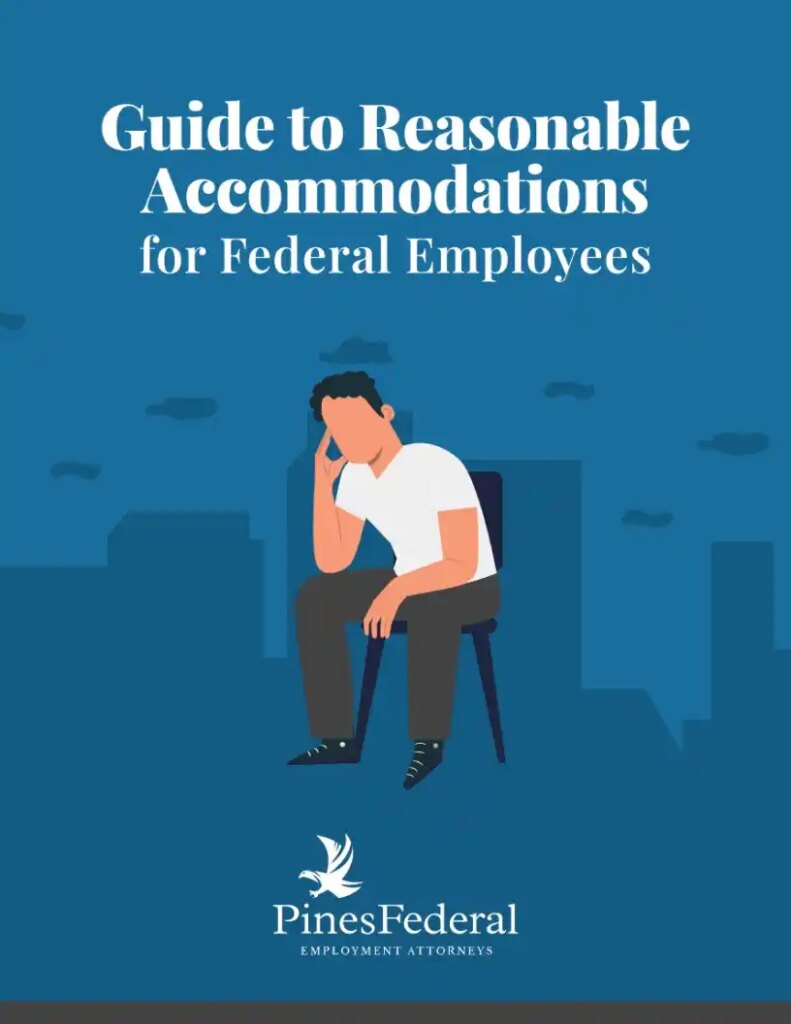Federal Reasonable Accommodation Lawyer Serving Employees Nationwide
If you are a disabled federal employee with mental or physical disabilities and require reasonable accommodations in the workplace, our legal team is dedicated to helping you with federal claim filing procedures in order to obtain the outcome you desire.
With over 60 years of collective experience, our federal reasonable accommodation lawyers at Pines Federal possesses a comprehensive understanding of federal laws to help you navigate through any legal complexities related to your case.
Reach out today.
- Why Choose Pines Federal?
- Does the Federal Government Consider Me Disabled?
- What is a “Qualified” Federal Employee for a Disability Reasonable Accommodation Request
Contact Pines Federal online or at (800) 801-0598 for a consultation with a Federal EEOC reasonable accommodation lawyer.
What Are Reasonable Accommodations?
Reasonable accommodations allow a person with disabilities to perform their job by having the employer make accommodations to either the hiring process, the job, the way the job is done, or the work environment. Accommodations are considered reasonable if they don’t create a direct threat or hardship to any other workers.
Under federal law, federal agencies are required to provide reasonable accommodation to qualified employees with disabilities unless doing so would cause undue hardship. The right to reasonable accommodations for both employees and applicants is protected by Title I of the Americans with Disabilities Act of 1990, also known as the ADA. The ADA and the reasonable accommodations clause aim to combat discrimination and ensure that individuals with disabilities have equal employment opportunities. Section 501 of the Rehabilitation Act of 1973 applies the ADA to federal employees.
To qualify for a reasonable accommodation, the worker must have a physical or mental impairment that substantially limits one or more major life activities.
Available Accommodation Options for Federal Employees
There are many accommodation options available, depending on the severity of the disability and other factors.
If you are disabled according to the Rehabilitation Act or the ADA, the agency is required to provide reasonable accommodations such as:
- Telecommuting/working from home
- Physical accommodations at the workplace
It is important to note that the employing agency must accommodate you with an accommodation that is effective, but not necessarily the best accommodation or the one that you request.
Which Employers Are Covered by the ADA?
The Americans with Disabilities Act of 1990 (ADA) protects employers from unlawful disability discrimination in the workplace. To receive protection from the ADA. you must be able to perform the primary work functions with or without reasonable accommodation. This means that your employer must believe that you have the qualifications needed to fill the job role, such as education, work experience, skills, or professional licenses. If you fulfill these requirements, an employer cannot refuse to hire you because of your disability.
The ADA extends this protection to employees from a wide variety of work sectors, including:
- private employers,
- state and local governments,
- employment agencies,
- labor organizations,
- and labor-management committees.
The Equal Employment Opportunity Commission (EEOC) and the ADA enforce employment discrimination laws to all government employers, regardless of the employees they had after January 26, 1992.
What Is Considered A Disability According to the ADA?
The ADA protects all disabled workers from discrimination based on their disability. The ADA qualifies a disability as having a “physical or mental impairment that substantially limits a major life activity.” The ADA also protects employers with a history of disability or employees who face disability discrimination from their employer, even if they aren’t disabled.
A substantial impairment is one that significantly limits or restricts a major life activity, such as:
- Hearing
- Seeing
- Speaking
- Walking
- Breathing
- Performing manual tasks
- Caring for oneself
- Learning or working
Featured Case Result
Our attorney negotiated a $245,000 settlement exclusive of fees and forgiveness of all advanced sick leave taken as a result of the Agency’s failure to offer telework to a human Resources Specialist suffering from multiple sclerosis. – Read more client success stories…
The Requirement of Providing Reasonable Accommodations for Federal Employees
Your employer has an obligation to provide you with a reasonable accommodation if you have a disability. The employer need not provide the accommodation if it presents an undue hardship in terms of cost and adjustments. This can be based on the employer’s size, resources and needs. An accommodation is acceptable if it is close to what the employee needs.
A reasonable accommodation is a change in the working environment to enable you to do the job, which can include:
- Providing interpreters or readers
- Modification of job duties
- Wheelchair access
- Accessible parking
- Readers for visually impaired workers
- Restructuring or flexible work sites
- Modified work schedules or air temperature
- Periodic breaks
- Working at home
- A private area to take self-medical tests
- Extra training
- A detailed schedule for completing tasks
- Accessibility technology
- Adaptive equipment
- Reassignment to a different, vacant position
[DOWNLOAD] Reasonable Accommodations for Federal Employees

Requests for Reasonable Accommodation
A reasonable accommodation is a change an employer makes to the work environment, schedule or procedures to help a disabled employee perform necessary job functions or important life activities in the workplace. The accommodation should make it easier for the employee to successfully perform the duties of the position. However, these changes must not impose an undue hardship, such as being too expensive or difficult to grant, on the employer.
If you want to request an accommodation, you or your Federal reasonable accommodations attorney must let your employer know that you need an adjustment at work due to a medical condition. The request must explain why you are having trouble performing work due to a physical or mental disability. For example, if you use a wheelchair and it doesn’t fit under your desk, you can request your employer to make the needed adjustments to solve this issue. If you need to request four weeks off for a back-problem treatment, this would also be considered a reasonable accommodation. Your reasonable accommodation request can be verbal and doesn’t need to be in writing.
Once your employer receives your request for reasonable accommodation, they may ask you relevant questions that will enable them to make informed decisions about your request. In some cases, an employer may ask you for written documentation that explains the details of your reasonable accommodation request.
Featured Case Result
WHAT HAPPENED:An SSA employee requested reasonable accommodations which were previously honored but a new supervisor revoked the accommodations. We won the client $65,300 and attorney fees for compensatory damages.
The Process of Requesting Accommodations for Federal Employees
Employees of federal agencies are afforded the same protections against disability discrimination that non-federal employees enjoy, and in some instances, even more protections. Federal employees receive protection under the Rehabilitation Act of 1973, which applied the Americans with Disabilities Act (ADA) to federal employees. Although this protection is guaranteed to federal employees, the process of obtaining adequate accommodations for disabilities or OPM disability benefits can be complex.
At Pines Federal, our federal employee lawyers can help you with every step of the process, including:
Determining Whether You Have a Disability
The first step, of course, is determining whether you have a disability. Although this seems like a simple determination, the answer changes based on whether you are seeking OPM disability, or just reasonable accommodations. To qualify for accommodations, you must establish that you have a disability as officially defined by the ADA and that you can still perform the essential functions of your job if given reasonable accommodations.
The more recent Americans with Disabilities Act Amendments Act of 2008 (ADAAA) has made it easier than ever for employees to qualify.
The standards for OPM disability are stricter, since these benefits are for those who cannot perform the essential functions of their job as a result of the disabilities.
Our legal team is dedicated to helping federal employees obtain the reasonable accommodations they need to perform their essential job duties.
Informing Employer of Disability/Providing Medical Proof
This can be a formal process involving a reasonable accommodation request form, or a more informal discussion with your office supervisors or managers. At this point, the agency can request medical proof of your disabilities. Pines Federal Attorneys can assist you with determining how much medical information an agency can request, and at what point your agency has asked for too much.
The “Interactive Process”
The “Interactive Process” is the technical name for discussions with your supervisor, or the Equal Employment Opportunity/Civil Rights Officer for your employer, regarding your need for medical accommodations (reasonable accommodation). The agency must engage in a back-and-forth discussion, as the parties attempt to negotiate the most mutually equitable solution.
Undue Hardship
For every federal employee who has a legitimate disability but who can also perform the essential job duties with reasonable accommodations, the employing agency is required to provide them with effective accommodations, unless doing so would cause the agency undue hardship. However, since the employer in these cases is essentially the federal government, this hardship argument rarely carries much weight. Still, if you meet resistance, you will need to request another discussion about your accommodations or file a case with your agency’s local EEOC/Civil Rights Office. Making the determination as to whether you should file a case is where our office comes in. We are here to help you determine if you have a legal entitlement to the accommodation you are requesting (and even assist you with determining what the best accommodation might be). We are also here to tell you when it is time to file a case against your agency.
What Constitutes Undue Hardship?
While employers, including the federal government, are required to provide employees with disabilities with reasonable accommodations, one exemption is if the accommodations present an undue hardship to the employer. Undue hardship may mean that the requested accommodations present significant difficulty, expense, or that would fundamentally alter the nature of operation of the employer’s business (or to the federal agency). Therefore, undue hardship can be both financial and practical.
Featured Case Result
Our law firm obtained $100,000 in compensatory damages, back pay, and front pay at the hearing for a medical assistant who was routinely denied accommodation and subjected to a hostile work environment for requesting accommodations. – Read more client success stories…
What If No Accommodation Is Possible?
If it would be impossible for you to fulfill your essential functions at work even with these accommodations, or if providing accommodations would somehow present an undue hardship on the agency, you could seek:
- Family and Medical Leave Act (FMLA) leave: This can be helpful if you have a temporary disability. FMLA will allow you to be absent from work and not disciplined for taking leave for 12 weeks. Although you will not be paid, your employer cannot discharge you or discipline you as a result of your leave.
- OPM Disability Retirement: This would be appropriate for long-term disability. OPM Disability is an early retirement option for disabled federal employees. OPM will pay you a monthly annuity based on your salary.
The line between a disability that can be accommodated and one that requires OPM disability is not always clear, and having an expert on your side can be invaluable for a federal employee who is already suffering a medical hardship. Often your human resources and EEO officer do not act in accordance with law and regulation. Having an expert to assist you at this time is essential.
It is noteworthy that sometimes, when an agency cannot provide reasonable accommodations, it may terminate the employee for disciplinary reasons, leaving the employee with great difficulty in seeking OPM disability benefits. If this happens to you, we can help you work with your agency to make sure you are in a much better position to obtain your OPM Disability Retirement benefits.
- Related: Federal Employees May Request Leave as a Reasonable Accommodation
- Essential Functions and Reasonable Accommodation
- What is Undue Hardship?
Will Filing a Disability Claim Help Me?
Employees who have been discriminated against based on disability are entitled to compensation. You can seek remedy to recover the position you would have been in if the discrimination never occurred. For example, many employees are denied jobs, promotions, reasonable accommodations, reassignments, and salary increases for discriminatory reasons. Filing a claim could help you regain what you were entitled to. Filing a claim may also help you cover attorney fees.
Can My Employer Ask Questions About My Disability?
If you are applying for a job, an employer doesn’t have legal grounds to ask you if you are disabled. Employers are also prohibited from asking you details about the nature or severity of your disability. An employer is only allowed to ask you if you can perform the job duties with or without reasonable accommodation. You may be required to explain what you will need to perform the job duties during an interview. But it is important to know that an employer cannot refuse to hire you because of your disability if you can perform the essential functions of the job with accommodation.
If you are already a federal employee, your employer cannot ask you questions about your disability unless they are related to your job. If your employer has been asking you questions about your disability for discriminatory reasons, you can file a claim against them.
Featured Case Result
WHAT HAPPENED: Our attorney negotiated a $60,000 settlement on behalf of the estate of a government employee who was not accommodated during their last few months on an end-stage disease.
A Federal EEOC Reasonable Accommodation Attorney Can Help
Managers and supervisors are not allowed to discriminate or otherwise ignore reasonable requests from their employees, or to retaliate if any requests for reasonable accommodation have been made.
Though reasonable accommodations for employees with disabilities are protected by the ADA and the Rehabilitation Act of 1973, applying for accommodations can be challenging. The process involves informing the agency you work for, providing medical documentation of your disability, and having back-and-forth discussions about your situation with your supervisor. Working with an experienced law firm, like Pines Federal, can help smooth the process and provide you with the guidance you need when you have questions.
Our attorneys can also help you should you meet any resistance or should your request be wrongfully denied. Furthermore, we can help you seek other options in cases where accommodations are truly impossible. For example, you may be able to apply for leave through the Family and Medical Leave Act – FMLA (a potential option for those dealing with a temporary disability) or help you through applying for OPM Disability Retirement (a potentially good choice for those with a long-term disability).
It is important to remember that it is illegal for supervisors and employers to discriminate against employees with disabilities. This includes denying or ignoring reasonable requests for accommodation as well as retaliating against requests for accommodations.
If you need help protecting your rights, contact our law firm. We are here to help.
At Pines Federal, our federal reasonable accommodation lawyers understand what it takes to aggressively protect your rights if you experienced discrimination or are concerned about your rights in regards to requests for reasonable accommodation. We have a reputation for being trusted and committed advocates, so do not hesitate to reach out to us immediately.
Related Reading
- Do I need to request Reasonable Accommodation if I want OPM Disability Retirement?
- Reasonable Accommodation vs. OPM Disability
- How Much Must the Agency Pay to Reasonably Accommodate Me?
- The V.A. Wrongly Denied Reasonable Accommodation Request for Service Chief to Telework
Check Out Our “Disability Inclusion in the Workplace” Series
For unique insights from successful business leaders, see attorney Eric Pines’s interview series “Disability Inclusion in the Workplace” on Medium:
- Gregory T. Miller Of Penn-Mar Human Services On How Businesses Make Accommodations For Customers and Employees Who Have a Disability
- Kevin Hanegan Of Qlik
- Tiffany Fixter Of Brewability
Contact Pines Federal at (800) 801-0598 and schedule a confidential consultation with our Houston federal employee attorney today.





